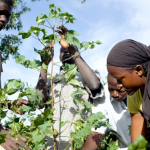
Field schools that train farmers in alternative methods of pest control have succeeded in nearly eliminating the use of toxic pesticides by a community of cotton growers in Mali, according to a new Food and Agriculture Organization for the United Nations (FAO) study published yesterday by the London-based Royal Society.
The study was conducted in two areas—the Bla region of southern Mali, where FAO established a field school program in 2003, and a second area, Bougouni, where the program was not yet active.

While only 34 percent of all cotton-farmers in the area participated in the program, pesticide use on all of Bla’s cotton farms—more than 4,300 households—dropped a staggering 92 percent. FAO’s study further found that the move away from pesticide use had no negative impact on yields.
The Bougouni area, where training has not yet taken place, saw no change in pesticide use over the same eight-year period. This suggests that knowledge of alternative methods in pest control was further disseminated in the Bla area by program participants to other farmers in the area, underscoring the potential of farmer field schools to act as catalysts for widespread practice change.
Slashing their use of chemicals and shifting to alternative “biopesticides” like neem tree extract, growers in the Bla study group reduced their average individual production costs.
By refraining from applying more than 47,000 liters of toxic pesticides, the farmers saved nearly half a million dollars over the study period.
Training farmers in alternative methods of pest control proved to be three times more cost-effective than purchasing and using synthetic pesticides, according to FAO’s analysis. More than 20,000 cotton farmers have been through field schools in Mali.
“We must learn from farmers’ experience. Pragmatic, field-based and farmer-centric education can and must play a key role in making agriculture stronger and more sustainable,” said FAO Director-General José Graziano da Silva. “At the end of the day, sustainable intensification will be the result of the collective action of millions of small farmers, who through their daily decisions determine the trajectory of agricultural ecosystems across the world.”
An Important Crop
Cotton is the principal engine of economic development in Mali, where an estimated 4 million farmers grow the high-value crop, accounting for eight to nine percent of Mali’s GDP and providing as much as 75 percent of the country’s export earnings.
Usage of pesticides in Malian cotton doubled between 1995 and 2001, but yields nonetheless fell due to increasing resistance among pests.
New Tools for Monitoring Risks
Two related studies from the same FAO project also published yesterday by the Royal Society—authored by Oregon State University (OSU) scientists together with researchers in West Africa and at various institutions, including FAO—reveal the extent to which pesticide use in West Africa poses risks to human health and environment.
One of these studies, conducted in 19 different communities in five West African countries, used state-of-the-art risk assessment models to provide the first detailed analysis of pesticide risks for this region. The results highlight a number of specific pesticides that pose widespread and significant threats to human health and terrestrial and aquatic wildlife throughout the region.
The study also found that farmer workers and family members, including children are routinely exposed to high concentrations of toxic pesticides such as methamidophos and dimethoate, in the crops where they work. Protective clothing that reduces pesticide exposure is largely unknown in West Africa, and reports of ill health, hospitalization and death due to chemical exposure by farm workers are not uncommon.
Lead author Paul Jepson of the Integrated Plant Protection Center at OSU states “we were shocked to find such widespread use of highly toxic organophosphate pesticides, but by carefully studying and quantifying their use, we provide a basis for much needed action by policy makers, researchers and educators.”
The authors suggest that a three-pronged approach to pesticide risk management, including monitoring systems to enable science-based decision-making, functional regulatory systems and effective farmer education programs.
The third study from the FAO project reports on the first use in the region of passive sampling devices (PSDs), developed by Oregon State University, which are technologically simple tools that sequester and concentrate a wide variety of pesticides and other chemicals found in the environment. The tool is a major advancement for monitoring pollution in remote areas of less developed regions.
PSD samples were deployed and then simultaneously analyzed in African and U.S. laboratories, as a proof of this concept. This opens the possibility for widespread analysis of pesticides in West African surface waters.
All three papers appearing yesterday in the Royal Society journal were co-financed by a six-country regional project, financed by the Global Environmental Facility (GEF) through the United Nations Environment Programme (UNEP) and executed by FAO, Reducing Dependence on Persistent Organic Pollutants and other Agro-Chemicals in the Senegal and Niger River Basins through Integrated Production, Pest and Pollution Management.
“This effort has facilitated a partnership between scientists around the globe and West African counterparts—the results are striking, and have the potential to transform the conversation about pesticide risks and sustainable crop management in this ecologically fragile region,” said William Settle, who coordinates the FAO project in Mali.
FAO undertakes its work on pesticide management in West Africa through close working partnerships with governments in the region as well as organizations such as the CERES Locustox Laboratory and ENDA-Pronat group in Senegal and Oregon State University’s Integrated Plant Protection Center.
Financing for the FAO program been provided by the European Union, the Government of the Netherlands, and a GEF/UNEP grant.
Visit EcoWatch’s HEALTH and BIODIVERSITY pages for more related news on this topic.


Leave a Reply
You must be logged in to post a comment.